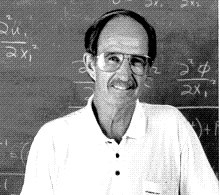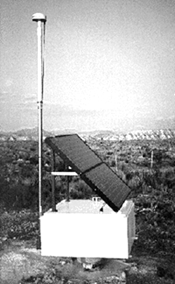
 GEOLOGICAL
SCIENCES
GEOLOGICAL
SCIENCES

 EUGENE T. HERRIN
EUGENE T. HERRIN
Ph.D., Harvard
Shuler-Foscue Professor

 ene Herrin's primary research interests
in seismology include: (1) extension of seismological observations to high
frequencies; (2) seismic observations in deep boreholes; (3) processing of high
frequency seismic data: (4) design of advanced seismic instruments and
observatories; and (5) research in the seismic verification of nuclear
arms-control treaties.
ene Herrin's primary research interests
in seismology include: (1) extension of seismological observations to high
frequencies; (2) seismic observations in deep boreholes; (3) processing of high
frequency seismic data: (4) design of advanced seismic instruments and
observatories; and (5) research in the seismic verification of nuclear
arms-control treaties.
Gene also considers theories of subatomic particles allowing for aggregates of quarks that have masses several orders of magnitude greater than the largest known nucleous. These nuclearites (quark nuggets) weakly interact with normal matter and probably collide with the Earth at galactic velocities (100's of km). If this type of dark matter exists, then passage of a quark nugget through the Earth should be detectivle as an earthquake with a linear source.
Along with theoretical physicist, Vic Teplitz, and systems analyst,
David Anderson, Gene has been searching the
world-wide database of earthquakes looking for unassociated events,
i.e., earthquakes that can't be assigned to natural and man-made causes.
Thus far, after an exhaustive search of the existing databases, there are no
certain examples of nuclearite collisions with Earth. Promising events
triggered new analysis of seismic wave travel times through the lower
mantle and the core and the role of antipodal events generating
unassociated earthquakes.
Selected Publications
Herrin, E., Corry, C.E., McDowell, F.W., Phillips, K.A., 1991, Geology of the
Solitario, Trans-Pecos Texas, Geological Society of America Special Paper
No. 250, 122 pp.
Herrie, E.T. and Teplitz, V.L., 1996, Seismic Detection of Nuclearites, Physics Review, vol. 53, n.12.
|
Dr. Eugene T. Herrin Department of Geological Sciences Southern Methodist University Dallas, Texas 75275-0395 voice: (214) 768-2760 fax: (214) 768-2701 |
|---|

 |
 |
 |
 |
 |
 |
 |

|